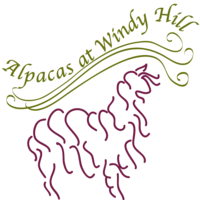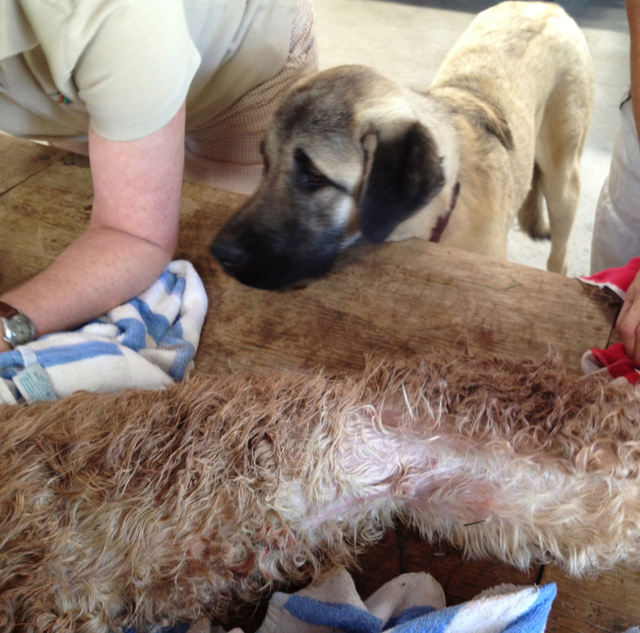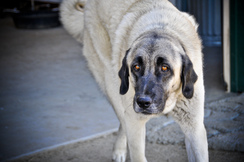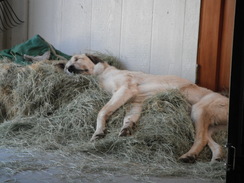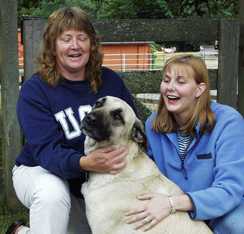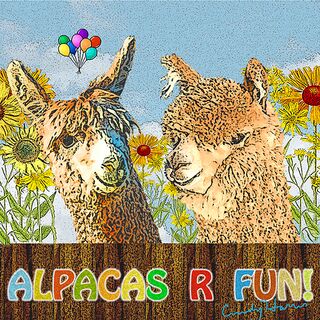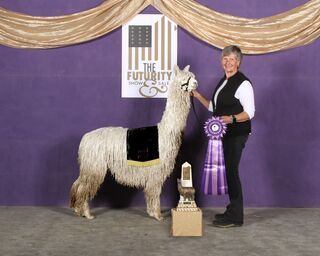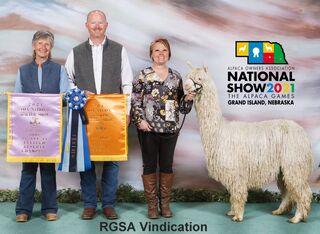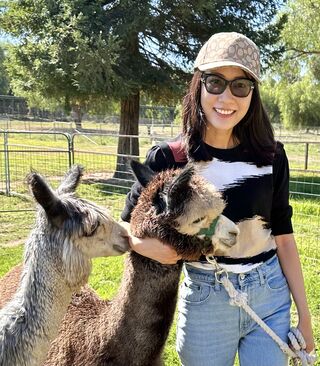Livestock Guardians
Why You Will Need One
I think most of us can agree that a dog is "man's best friend", but that's never as true as it is on an alpaca ranch. It can't be just any dog, though. It takes a special dog--a Livestock Guardian Dog-- to work with livestock, and alpacas in particular. At Alpacas at Windy Hill, that dog is the Anatolian Shepherd Dog. We don't raise them, but we love them!
Most visitors fall in love with our Anatolians. Who wouldn't fall in love with 120 pounds of huggable, furry sweetness?! But they're not for everyone. An Anatolian Shepherd needs a job protecting livestock. They need to live outdoors and be responsible for their herd. They don't need much --food, a little vet care, some shelter from the elements-- and you will find them willing, in a split second, to sacrifice their lives in defense of their herd.
Anatolians need some training to be sure they are doing the job we hired them to do, but they are also very independent and have a strong opinion about how things should be done. Anatolians need things to be in order, so they will take the leadership position if it appears that no one else is going to. They need a firm pack leader--a human they look to as 'alpha'--so that they can do their job and not feel like they need to do ours. Basic manners need to be reinforced early on, such as not jumping on people, and no biting, even in play. It's a good practice to ask an LGD to sit before you give them a treat, also, so that they remember that you are in charge. Anatolian in the feeder
Athena and silly Solomon Some behavior traits are unique to this 'genre' of dogs. Remember "Old Yeller" who would "steal you blind while you're watchin' him"? That's an Anatolian. Remember to store things you care about up high. Anatolians mature slowly, and are often pranksters until they are three years old. One time I was giving a workshop about LGD's. The group was getting their coffee before class when a man whispered to me, "Your dog just took off with the muffins..." I looked out the barn door just in time to see Athena, then a yearling, running full tilt out to the pasture with a big tray of Costco muffins in her mouth. It was the perfect introduction to our class that day!
Other favorite pranks include shredding straw hats and stealing tools that are left in reach. Work gloves are a favorite because they are chewy and salty. Almost anything will do, however--sunglasses, cell phones, water bottles. The most attractive commonality in all these objects is that they belong to a human, and it's a 'no-no' to take them. Most dogs will chew on chew toys, but Anatolians find joy in chewing on shearing table straps, buckets, halters and leadropes. They may even mistake an electrical wire or the garden hose for a snake and bring it to you proudly, expecting praise.
Another time-honored, instinctual behavior is digging. Oh, how an Anatolian loves to dig! Not only to they enhance and enlarge gopher holes, but they also find it necessary to dig themselves a slight depression to sleep in--sometimes a new one every night!
They can make themselves almost invisible by lying in the depression with only their noses showing about the edge. It's a way to camoflage themselves while they watch for predators. And one hole isn't quite enough. They need a vantage point in every possible area--"all the better to see you with, my dear".
A dog hath true love,
A dog hath right good understanding,
A dog hath force and kindliness,
A dog hath mettle and is comely,
A dog is in all things seemly.
A knowing dog thinketh no evil,
A dog hath a memory that forgeteth not,
I say unto you again a dog forsaketh not his duty,
Hath might and cunning therewith
and a great brave heart.
~Gace de la Vigne
Anatolians Shepherds can be socialized in a number of ways, depending on your situation. We have chosen to socialize our dogs with people.
We live on 25 acres and have lots of visitors all the time--boarders, friends, and people coming for tours-- so we need our dogs to be accepting of people we let through the gate.
When young children come to visit the ranch, they usually end up rolling around in the dirt with the Anatolians rather than paying much attention to the alpacas. An Anatolian that is well-socialized will adopt and protect whatever you train it to guard. I have seen newly-hatched chicks run safely across their LGD's nose as he slept. I have seen Solomon asleep in the feeder while the alpacas ate around him. I have seen gigantic dogs curled up with a kitten or a small child for a nap.
Some LGD owners who live near hunting areas train their dogs to stay away from strangers. It is safer for the dog to avoid people running through their property who might have guns. Our dogs are very accepting of people in the daytime, but once it gets dark, everything changes. And you certainly want to avoid looking anything like a coyote!
Most LGD's are "wanderers", and the Anatolian is no exception. Although the prey instinct has been bred out of them over the centuries and they will allow a rabbit to run by unmolested, if they find the gate open, or the fence too short, they will gleefully take off looking for the coyote that teased them all night. I think that once they get out there, they might say, "Gee, Mom, why didn't you tell me the yard was so big??"
Several new LGD owners have called me over the years to report that their dog(s) is missing. Usually they "only left the gate open for a minute" while they carried something in, or unloaded their car. It only takes a minute! And LGD's don't come home when they're hungry like other dogs. They are the top of the food chain, and they can travel vast distances in a short amount of time.
After I had had my first two Anatolians for about a year, a workman came through my gate earlier in the morning than I had expected him. After driving through the gate he paused to look for something in his truck. I had warned him about this problem, but he didn't really believe me. My two beautiful dogs slipped through the gate without him even noticing. I was in the house at the top of the hill and couldn't get there in time. No amount of calling, driving the area, or putting up posters helped me get them back. They were tagged, microchipped, and I had posters up at every agency for a 100 mile radius, but I never saw them again. It was then that I developed a good relationship with NASRN (National Anatolian Shepherd Rescue Network). My next dog was a rescue through NASRN, and he worked out beautifully. If you need an adult dog to start with, NASRN is a great organization to deal with because they know their dogs really well and are very cautious about placing them so that they are placed correctly.
When starting out, I recommend that you start with an adult dog who has successful working experience. These dogs can sometimes be found through Rescue, like NASRN (National Anatolian Shepherd Rescue Network). Rescue is usually very selective about who they will place as a working dog. This can actually be better than getting one from an owner who has to give it up. The owner may have a great need to place the dog and let that cloud their judgment about the placement and the suitability of the dog. Rescue has a vested interest in not getting the dog returned to them, so will try to make sure the dog is placed appropriately.
In my opinion, the best way to train an LGD is to have an older dog do it. I have never been successful learning to speak fluent LGD language, but an older, experienced dog is excellent. Since I began using older dogs to school my pups, I no longer have puppies that chase the alpacas and try to play with them.
These comments simply reflect my musings on Anatolian Shepherds and LGD's (livestock guardian dogs) after having them for many years. I love them dearly. They are the "big dog" I always wanted as a child, and I am grateful to alpacas for helping me find them.
If you are interested in learning more about this wonderful class of dogs, here are some websites that will cast much more light on the subject than I am capable of. Enjoy you research, and I hope you will come out and meet our Anatolians. They would love to meet you!
http://en.wikipedia.org/wiki/Anatolian_Shepherd
http://www.akc.org/breeds/anatolian_shepherd_dog/index.cfm
http://www.asdca.org/
Cheetah Conservation and Anatolians: http://www.youtube.com/watch?v=njqi6f057s8&feature=youtu.be
http://www.youtube.com/watch?v=g67e0hDT1oQ
http://www.citlink.net/~lostarmadillo/ (Lost Armadillo is Solomon's and Molly's breeder)
http://www.nasrn.org
Tuesday, June 23, 2020
